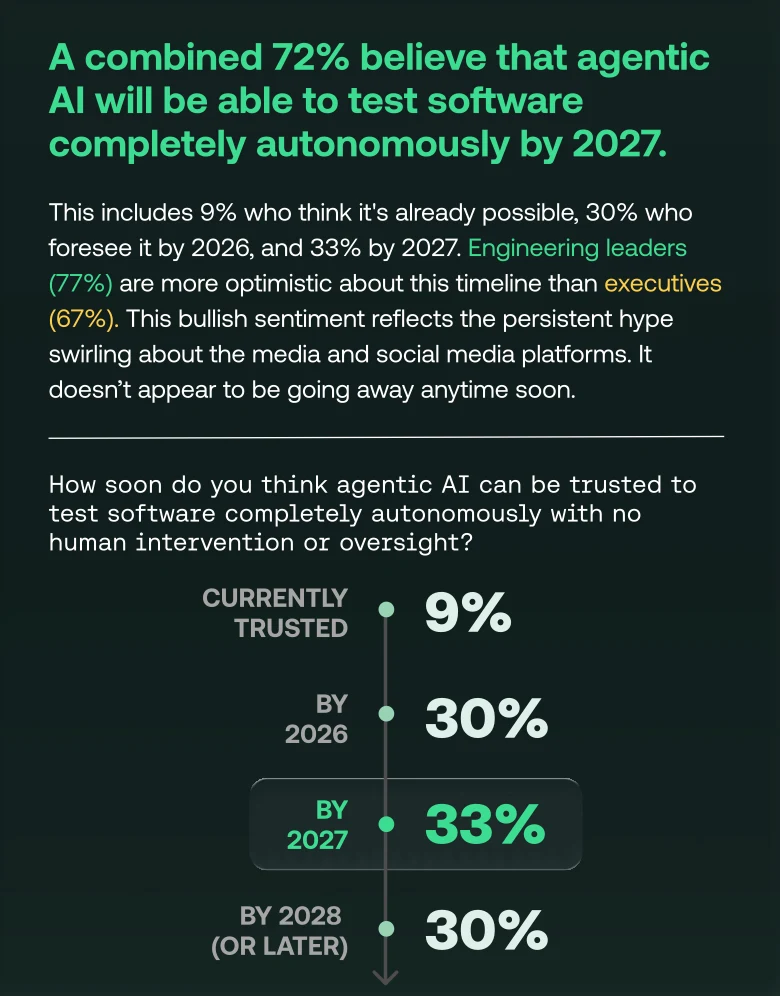
The buzz around agentic AI is undeniable, but what's really happening behind the scenes on software testing teams? We surveyed 400 software testing executives and engineering leaders last June to get the real story on how organizations are adopting, using, and feeling about AI agents — i.e. artificial intelligence systems that can operate autonomously without constant human prompts, analyze situations, plan sequences of actions, and execute tasks to achieve specific goals based on real-time feedback and results.
The results reveal a complex environment of optimism, caution, and some surprising disconnects that we have compiled into our latest research report: The 2025 Software Testing Vibe Check: Agentic Edition. Download and read the full survey results or read through the top takeaways below:
1. Leadership is sometimes flying blind on software testing
61% of respondents believe their top leadership lacks a full understanding of software testing requirements. This disconnect is even more pronounced among engineering leaders (65%) compared to executives (57%). When critical AI adoption decisions are being made without sufficient technical insight, it can be a recipe for misaligned expectations and failed implementations.
2. Agentic AI adoption is exploding (whether executives know it or not)
While 58% of companies with internal testers already use agentic AI for software testing, there's a telling gap: 68% of engineering leaders report using it versus only 48% of executives. An additional 39% plan to adopt it soon, meaning 97% of companies are either using or planning to use agentic AI for testing. The question isn't whether agentic AI is coming—it's already here.
3. Optimism about full autonomy is sky-high (maybe too high)
72% believe agentic AI will be able to test software completely autonomously by 2027, with engineering leaders (77%) even more bullish than executives (67%). However, this optimism may be outpacing reality, as most current AI agents consistently fall short of their promised capabilities.
4. When AI fails, humans take the blame
Here's a troubling finding: 60% of leaders say employees bear the brunt of blame when AI makes mistakes, not the AI providers or programmers. Combined with the fact that 95% of companies have experienced AI setbacks, this creates a precarious environment where those closest to the technology shoulder disproportionate responsibility for its failures.
5. Security concerns trump competitive pressure
Despite the rush to adopt agentic AI, 72% are more nervous about granting AI agents full company data access than falling behind competitors. This concern is particularly acute among executives (82%) compared to engineering leaders (63%), highlighting another significant alignment gap between organizational levels.
What this means for your organization
The survey reveals a fundamental tension: while organizations recognize agentic AI's transformative potential, they're grappling with legitimate concerns about security, accountability, and readiness. The overwhelming preference for hybrid approaches (85% favor mixing human and AI testing) suggests that the future isn't about replacing human expertise—it's about augmenting it thoughtfully.
Our recommendation? Start by addressing the leadership knowledge gap before making major AI investments or changes. Develop clear accountability frameworks, maintain realistic timelines, and remember that falling behind competitors isn't worth compromising your security or team stability.
The agentic AI revolution is here, but success will belong to organizations that balance ambition with wisdom, hype with reality, and innovation with responsibility.
Ready to dive deeper?
These findings only scratch the surface of what we discovered. The full survey report contains detailed breakdowns of adoption strategies, trust levels across different AI functions, organizational response patterns to AI setbacks, and actionable recommendations for implementing agentic AI successfully at your organization.
Whether you're just starting to explore agentic AI or looking to optimize your current approach, the complete guide provides the benchmarks and insights you need to make informed decisions about your testing strategy.
Download the complete agentic AI survey guide to access the full data set, methodology details, and strategic recommendations that can help position your organization for success.
*This survey was conducted in June 2025 in partnership with Wakefield Research, polling 200 U.S. executives and 200 U.S. engineering leaders.



